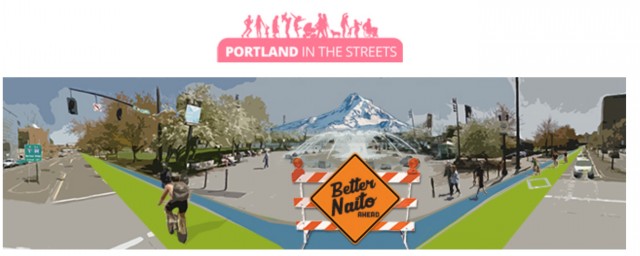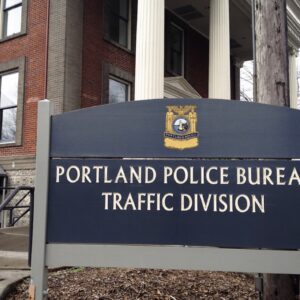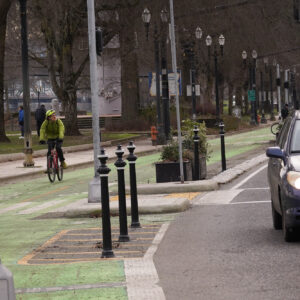Just when you thought May couldn’t get any better for biking in Portland, the City just announced that their Better Naito project will be returning this summer. The Bureau of Transportation says one northbound lane of Naito Parkway will be converted to a two-way biking and walking facility from May 2nd to July 31st.
Better Naito debuted in June of last year as a partnership between the city and tactical urbanism group Better Block PDX. They worked together to create a safer way to walk and bike on Naito for two weeks during the busy summer festival season on Waterfront Park. After a successful first run, the temporary lane returned for another week in July.
This latest announcement is a significant extension of the project and could lay the groundwork for a permanent change to Naito. The nearly three-month demonstration will reconfigure Naito from SW Main Street to NW Davis. That’s a distance of about 0.7 miles.
Portland Mayor Charlie Hales has said adding a new bikeway to Naito is something he wants to do. Last September when I asked him about making Better Naito permanent he said, “That’s the next thing on our list.”
According to the city, the impetus for the change is the safety of the 15,000 people that attend various festivals in Waterfront Park per day during the peak season. “To reach the festivals,” wrote the city in a statement, “People are too often forced to squeeze into narrow dirt paths, walk in a bike lane, or bike in a travel lane with motorized traffic.”
Advertisement
Even with the driving prohibition on one lane of Naito, data collected during the 2015 Better Naito implementation found that during non-peak hours, motor vehicle travel times were not significantly impacted.
Because of the success of this project last year, PBOT has announced that Community Event Permits will be made available to festival and event organizers who use Waterfront Park. The permits will allow them to, “implement placemaking features along the Better Naito corridor and create a physically separated space for people walking and biking in order to help everyone safely and comfortably access the waterfront.” The events that eligible for these grants include: the Cinco de Mayo Fiesta, the Portland Rose Festival City Fair, Portland Pride Fest, Waterfront Blues Festival, BIKETOWN Bike Share launch event, and the Oregon Brewers Festival.
PBOT also released a new video (above) about last year’s project and a website with more information.
— Jonathan Maus, (503) 706-8804 – jonathan@bikeportland.org
Our work is supported by subscribers. Please become one today.









Thanks for reading.
BikePortland has served this community with independent community journalism since 2005. We rely on subscriptions from readers like you to survive. Your financial support is vital in keeping this valuable resource alive and well.
Please subscribe today to strengthen and expand our work.
Given the apparent success of the project last year (congratulations, Better Block) is there a reason it can’t return on a permanent basis?
Make it permanent.
I think something beside the plastic posts could be used. Use the whole lane instead of just half of it.
“The nearly three-month demonstration will reconfigure Naito from SW Main Street to NW Davis.”
My kingdom for a permanent closure of the Naito gap.
Tourist season?
Yeah, nobody uses Naito anyway. All I ever see is bikes on it.
This is great! Wonder if they’ll do something to make it easier for bikes to make left turns off of Naito, though this will already help because you’ll only be crossing one lane of traffic instead of two.
Will they do something about people parking in this wonderful two-way “bike” lane? I commute north on Naito by bicycle most days and honestly it’s harder to bike when they set up this special lane because some spoiled drivers act like it’s a parking spot for talking on their cell phone. I tell them get out of the lane and they say something like they won’t be there much longer, as if blocking bicycle traffic isn’t as important as their phone call.
I see this frequently. Whenever I see cars purposely in the bike lane, I make sure I pass close enough to brush the mirrors as a subtle hint.
They may not care about cyclists, but they do worry about their paint being scratched.
I tend to stop, get my phone out, and make sure they’re watching as I purposefully point it at their licence plate.
You wouldn’t BELIEVE how quickly they move if I do this.
Time to make a Better Barbur !
I’ve ‘heard’ rumors that a friendly warning slap on the fender doesn’t hurt sometimes either.
Sounds like you are just itching for a friendly confrontation by doing that.
This should be permanent, this should have been done when they repaved Naito.
I can see why the city would only want this to be temporary. Waterfront park is pretty dead during the winter months. There is definitely an argument for an April – September closure, though. Hopefully they will continue to expand the summer closure in the future.
It’s not a closure, it’s an opening. There’s plenty of space to drive on Naito even during “Better Naito”; there’s no space for all ages and abilities to bike comfortably on Naito, or walk comfortably on the E side of Naito during non-“Better Naito” times.
Good catch. The Portland Business Journal had an article yesterday, “Naito Parkway to again close during Waterfront festival season”.
One might say it’s just a matter of perspective, but semantics are important – it is an opening for those of us down the vulnerable-road-user ladder … and not even a full ‘closure’ when one of two auto lanes is still available for the behemoths.
Kudos to the city for supporting this safety improvement.
I have a dream. Bit by bit the cones come out, carving out safe zones for bikes. Then as the cars recede in to history, dwindling away like the dinosaurs, the cones take over more and more of the asphalt covered earth untill the day when autos are done and we can put the cones away because we don’t need them any more.
In all fairness, what the city does makes sense. Even if they did this in the winter months, I doubt many cyclists would take Naito for the simple reason that if a single light catches you, you could have made better time on the riverfront. But once activity on the riverfront picks up, Naito is faster, more fun, and safer than dealing with the craziness on the riverfront.
Once it gets really busy, it all spills out anyway so all the city is really doing is formalizing the way that moves people the fastest.
I ride Naito every day between Market and the Steel Bridge. Frankly, Naito’s one of the easiest parts of my commute to ride until the Steel Bridge. The upper deck is dodgy if you’re on the road and if you take the walkway, it’s tight with the peds. But above is still better than going below unless you want to ride the Esplanade on the east side.
That’s your experience. Can you think about the range of other people who might bike? Do you think a grandma new to biking, or a parent riding with a young child on his own bike, would feel comfortable on Naito currently?
Yes, we don’t have a full network of low-stress bike routes connecting to Naito. But, in today’s political and funding environment, a network is made one strand at a time.
If they made it permanent, why do the lights for the auto lanes need to apply to the bike lanes? Take down the lights in the former right NB lane, problem solved. I’m pretty confident a bike turning onto Naito could enter the bike lanes without stopping bike traffic.
Because, people walk across Naito when there’s a red light for car/bike traffic along Naito.
I don’t. But such a person would be much better served by the riverfront. If we’re working on building strands, they need to be in areas that are poorly served rather than fine tuning some of the better facilities we have.
One thing that promotes car culture and sets cycling back is messaging within the cycling community that riding is unsafe. It scares nonriders and intimidates beginners. As a community, we focus way too much on what has to be provided before something will be safe and not enough on helping people understand what they can do to ride safely and that the benefits of cycling are way more accessible than they think.
What would contribute more to safety than anything else is simply having more cyclists everywhere. Aside from greater presence leading to greater awareness, it makes it much easier to get people on board with real infrastructure projects.
It’s not about what IS safe (objective safety) – it’s about what FEELS safe (subjective safety). Cycling is already the safest form of transportation, once you count health impacts. But, I think people are WAY more likely to try it and make a habit of it if they don’t feel the need to contemplate the possibility of their grisly demise every few minutes while doing it. Infrastructure, education, enforcement, and changing our driving culture are the ways I see to do that.
http://www.mrmoneymustache.com/2013/06/13/bicycling-the-safest-form-of-transportation/
No, I don’t think timid/new/older people would necessarily be served better by the path at all times. In the summer, it’s often far too busy with walkers – and the “Better Naito” temporary design is far too narrow, with bikers coming the other way right next to you, to be comfortable either. Really what’s needed is a road diet on both sides of the street so you can have a cycle track or wide physically protected (e.g. by planters) bike lanes on both sides. If implemented , that would be would be where I would send my late-sixties mom to ride a bike share bike in the summer, not the crazy waterfront path.
Totally agreed, and I’m all for lowering real and perceived barriers to entry. I am especially in favor of separated areas kids can use while they’re learning since they’re harder to see, aren’t good at risk analysis or realizing what knuckleheads some drivers are, and are prone to making sudden moves that are very dangerous around inattentive motorists.
At the same time, I think it’s critical that cycling not be perceived as something that requires any particular type of person (in terms of fitness, risk tolerance, philosophy, etc).
I see a huge difference between providing facilities that make it easier for to begin and putting out the general message that this is the only way to ride safe. Pretty much the entire town is ridable, but if you ride busier roads like Macadam, Lombard, Colombia, Powell, MLK, etc, motorists sometimes yell that I should be on a cycling street, even if I’m not hindering their progress.
They are all cycling streets and the more people that ride everywhere, the more comfortable people are going to feel getting started. That can be used as a platform to boost their skills, confidence, and ability to get around this town.
PBOT just posted the loading zone rules for Better Naito. It will be used for truck unloading at all hours except four: peak morning and evening. This is a massive disappointment. Using a cycle path as a truck unloading lane is not 8-80 and not Vision Zero. PBOT needs to try harder.
Are these new loading zones that weren’t there previous to Better Block?? If so, the safety index just dropped precipitously … which is kinda crazy since the primary purpose of the whole project is to improve safety.
Info on the loading zones from PBOT
Looks like a car, presumably taking a left from Start onto Naito took out three of the temporary pylons. I re-placed them, but one is at permanent half-mast.